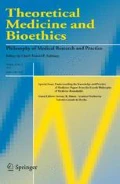Abstract
The purpose of this paper is to review the rising influence of commercialism in American medicine and to examine some of the consequences of this trend. Increased competition subverts physician collegiality, draws hospitals into for-profit ownership and behavior, and leads clinical investigators into secrecy and possibly into bias and abuse. Medicine faces a deprofessionalization evidenced in loss of control over the clinical setting and over self-regulation. Health care becomes a commodity relying on cultivation of desires instead of satisfaction of needs, even as many basic needs go unmet. Patients become consumers empowered with lawsuits and the connection of medicine to the relief of suffering is attenuated. Medical encounters are increasingly impersonal, dominated by specialization, technology, and bureaucracy. Patients are losing their physician-advocates to new conflicts of interests, physicians are losing their impulse to charity, and trust in the doctor-patient relationship and in medicine generally is eroding.
Similar content being viewed by others
References
Starr P. The Social Transformation of American Medicine. New York: Basic Books, 1982.
Hyman DA, Williamson JV. Fraud and abuse: setting the limits on physicians' entrepreneurship. N Engl J Med 1989;320:1275–8.
Iglehart JK. The debate over physician ownership of health care facilities. N Engl J Med 1989;321:198–204.
Jensen HL. The physician as an entrepreneur. In: Monagle JF, Thomasma DC, eds. Medical Ethics: A Guide for Health Professionals. Rockville, MD: Aspen Publications, 1988:350–7.
Brock DW, Buchanan A. The profit motive in medicine. J Med Philos 1987;12:1–35.
Relman AS. Practicing medicine in the new business climate. N Engl J Med 1987;316:1150–1.
Dougherty CJ. Ethical perspectives on prospective payments. Hastings Cent Rep 1989;19(1):5–11.
Bean LR. Entrepreneurial science and the university. Hastings Cent Rep 1982;12(5):5–9.
Relman AS. Economic incentives in clinical investigation. N Engl J Med 1989;320:933–4.
Chase M. Mixing science, stocks raises questions of bias in the testing of drugs. Wall Street Journal 1989 Jan 26:1(col 1).
Hillman AL, Pauly MV, Kerstein JJ. How do financial incentives affect physicians' clinical decisions and the financial performance of HMOs? N Engl J Med 1989;321:86–92.
Kaiser JM, Brown J. Ethical dilemmas in private rehabilitation. The Journal of Rehabilitation 1988;(Oct/Nov/Dec):27–30.
Nadolsky J. Ethical issues in the transition from public to private rehabilitation. The Journal of Rehabilitation 1986;(Jan/Feb/Mar):6–8.
MacMillan-Scattergood D. Ethical conflicts in a prospective payment home health environment. Nursing Economics 1986;4(4):165–70.
Relman AS. The new medical-industrial complex. N Engl J Med 1980;303:963–70.
Winkenwerder W, Ball J. Transformation of American medicine. N Engl J Med 1988;318:317–9.
Levey S, Hesse D. Bottom line health care? N Engl J Med 1985;312:644–7.
Anderson G. Universal health coverage in Korean. Health Aff 1989;8(2):24–34.
Dougherty CJ. American Health Care: Realities, Rights and Reforms. New York: Oxford University Press, 1988.
Robertson WO, Cohn BP, Conkling WS, Kuehn HJ, Moloney C, Tanis AL. Guidelines for expert witnesses testimony. Pediatrics 1989;839:312–3.
Jonsen A. The fall of Asklepios: medicine, morality, and money. Plast Reconstr Surg 1988;82:147–50.
Relman AS, Reinhardt U. An exchange on for-profit-care. In: Gray BH, ed. For-Profit Enterprise in Health Care. Washington, DC: National Academy Press, 1986:209–23.
Reinhardt U. Resource allocation in health care: the allocation of lifestyles to providers. Milbank Memorial Fund 1987;65(2):153–76.
Almy TP. The role of the primary physician in the health-care ‘industry’. N Engl J Med 1981;304:225–8.
Rabkin MT. Economics and ethics: delicate balance for providers. Health Progress 1981 (Nov):40–4.
Author information
Authors and Affiliations
Rights and permissions
About this article
Cite this article
Dougherty, C.J. The costs of commercial medicine. Theoretical Medicine 11, 275–286 (1990). https://doi.org/10.1007/BF00489818
Issue Date:
DOI: https://doi.org/10.1007/BF00489818




